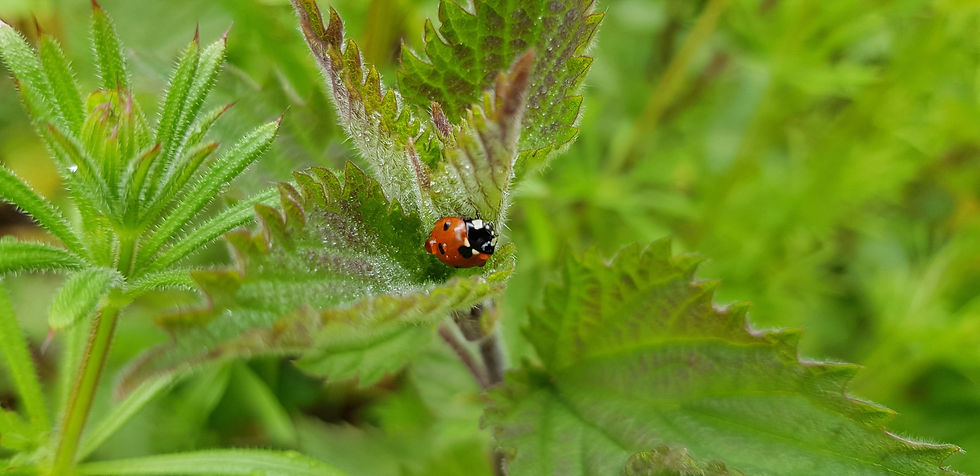Finally some warmth, and lots of wildlife and wildflowers
- Louise Barnetson

- May 11, 2023
- 3 min read
By Louise Barnetson

The Spring took a little while to get going this year so we've been pleased to enjoy a little bit of warmth in recent weeks. Whilst out and about with our wonderful volunteers we've been particularly enjoying the birdsong and butterflies, more wildflowers starting to show their colours, trees coming into leaf, and spotting a few slow-worms having merged from their winter hibernation.
The Painted Lady butterfly, pictured above enjoying the Bluebells, was spotted at St. James Churchyard in Birdham. The Painted Lady is a long-distance migrant, arriving each year in the UK from such faraway places as North Africa, the Middle East, southern Europe and central Asia. We were surprised to see one so early in the season.

Our Wittering Area Community Conservation Project continues with our weekly volunteer sessions across the parishes of West Wittering, East Wittering, Bracklesham, Earnley, West Itchenor and Birdham. Now that Spring has sprung and bird breeding season is in full swing, we stop our habitat management activities and turn our attention to surveying our sites - finding out what wildflowers are growing, and what wildlife we can find.
This is a wonderful time of year to be out enjoying the fruits of our labour - our habitat management activities that take place during autumn and winter - and brushing up on our wildflower and wildlife identification skills. Our volunteer survey sessions focus on identifying all the flora - plants don't tend to run or fly away and don't mind what the weather is like! - but as we wander we keep our eyes and ears open to wildlife. Listening for birds, searching for insects, peeping under reptile refugia, looking under logs, and peering into ponds.
We identify and record all the wildflowers, trees and other flora at the sites we survey. At our recent visit to Birdham we identified over 100 species of flora at four different sites. All our flora and fauna sightings are uploaded to iRecord and made accessible to the Sussex Biodiversity Records Centre.

These three little Bank Voles and their friend the Slow Worm were found under a reptile survey tin in West Wittering. Slow Worms eat invertebrates, including slugs, worms, snails and spiders, so the Bank Voles are perfectly safe in their company! The Bank Vole is a small native mammal often found in woodlands, hedgerows, parks and gardens.

These lovely golden coloured Slow Worms were found under a reptile survey sheet in Birdham. Slow Worms are one of our native reptiles and are actually a legless lizard. They are commonly found in damp shaded areas and can often be found in compost heaps. They are a gardener's friend as their favourite food is slugs!

The 7-Spot Ladybird is a common sight, often spotted on nettles like this one found in West Wittering. It is easily recognisable by the pattern of 7 spots on its red wing cases and is another gardener's friend as it feasts on aphids.

This young Oak tree in a Birdham churchyard, just coming into leaf, is decorated with brown marble-like growths known as galls. They are a growth on a plant that is made of plant tissue but caused by another organism. These are most likely the work of the oak marble gall wasp, but there are many different types of gall. In this case it is the tiny wasp that lays its eggs in the developing buds of susceptible oak trees. This causes the development of a spherical gall. which contains a central chamber where the wasp larva develops and eventually emerges through a tiny hole when it is fully developed. The Oak is a true titan of biodiversity, supporting around 2,300 wildlife species!

The Silver Y moth - named for the marking on its wing - is a common moth that can be seen during the daytime particularly across flowery grassy areas. It feeds on the nectar from flowering plants. This specimen was also spotted at the churchyard in Birdham. Churchyards are important havens for wildlife, often rich in wildflowers and old trees, and sometimes bordered by hedgerows. Our Family Wildlife Event is taking place at St. James Churchyard in Birdham on Saturday 27th May - please bring the children or grandchildren along!

Why not come out and join us at one of survey sessions over the next few weeks? No experience necessary and no heavy lifting or strenuous physical exercise required. Just a gentle wander through some lovely green spaces, taking notice of the natural world around you. There's also hot drinks and cake! Sign up here: https://www.mwhg.org.uk/volunteer




Yorumlar